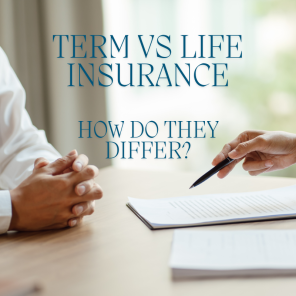Term Insurance Vs Whole Life Insurance:
Life insurance benefits your loved ones when the inevitable happens. While it can be tough to think about your death, choosing the right term or whole life insurance policy can protect your household and allow you to leave a legacy to those you care about the most.
When deciding between term vs. whole life insurance, the most important factors are cost, time frame, and whether you want a savings component with your policy. Term life insurance is generally cheaper and easier to afford, however, it is just for a set term and after that term has expired, you will not be covered by your insurance provider which can be a nuisance.
Whole life insurance on the other hand is undoubtedly more expensive than term life insurance, it provides relief for life, and in the off chance of a sudden death, your legacy, and your loved ones will be protected and helped in being carried forward.
Choosing the policy that gives you the right amount of coverage at a price you can afford is important, and knowing whether you need temporary or permanent insurance can help you decide. Learn the difference between term life and whole life insurance to choose which suits your situation best.
Life insurance policy types can be put into two main buckets: term life and cash-value life insurance. One of the choices for cash-value life insurance is whole life insurance. There are other cash-value choices, too. Knowing the main differences between term vs. whole life insurance will help you zero in on the best life insurance.
Term Life Insurance: –
Now, you might have heard about ‘Term Life Insurance’ before, but do you know the important details? Term life insurance policy can be a minimum of one year. This type of policy is also referred to as Annual Renewable Term (ART) insurance.
ART policies provide coverage for one year and can be renewed each year, often with an increasing premium based on the insured’s age and health at the time of renewal. This offers flexibility for those who need temporary coverage or are between longer-term policies.
Term life insurance is cheaper than whole life insurance, it is also easier to understand and comprehend as compared to Whole life insurance due to its straightforward coverage.
Term life insurance plans are also offered for 10-20-30 years, depending on a person’s personal needs. It can also help in securing a higher death benefit for a lower premium as compared to a Whole Life Insurance plan.
Term life insurance is also ideal for covering temporary financial responsibilities such as mortgages, children’s education, car payments, etc.
However, on the other hand, it has plenty of cons as well such as: –
- Temporary Coverage: Only provides coverage for the specified term; once the term ends, so does the coverage.
- No Cash Value: Unlike whole life insurance, it does not accumulate cash value or savings components.
- Increasing Premiums: Premiums can increase significantly upon renewal, especially as the insured ages.
- Limited Options for Renewal: Some policies may not offer renewal or may require a medical exam for renewal.
- No Payout if Term Ends: If the policyholder outlives the term, there is no death benefit payout.
Whole Life Insurance: –
Whole Life Insurance offers several benefits, making it an attractive option for many. It provides lifetime coverage, ensuring that as long as premiums are paid, the policy remains in force. One of its significant advantages is the accumulation of cash value over time, which policyholders can borrow against or withdraw if needed.
Premiums are generally fixed, offering predictability in long-term financial planning. The death benefit is guaranteed, providing peace of mind that beneficiaries will receive a payout regardless of when the insured passes away.
Additionally, some policies pay dividends, which can be used to reduce premiums, increase cash value, or be taken as cash. Whole Life Insurance also has tax advantages, as the cash value grows tax-deferred, and the death benefit is typically tax-free to beneficiaries.
However, Whole Life Insurance also comes with certain drawbacks.
- It tends to have higher premiums than term life insurance, which can be a significant financial commitment.
- The policies are more complex, involving elements like cash value and dividends that may be confusing. For the same premium amount, the initial coverage amount is usually lower than what term life insurance would offer.
- If a policyholder decides to surrender the policy early, they may face high surrender charges. Additionally, the rate of return on the cash value portion might be lower compared to other investment options.
- Lastly, changing the policy terms, such as adjusting the death benefit, can be difficult and may incur additional costs.
Furthermore, there is no hassle of choosing a new policy after X amount of time, and you can also build cash value that you can borrow against, which makes it a more complex and expensive ‘product’.
Learn more about top insurance providers today.
